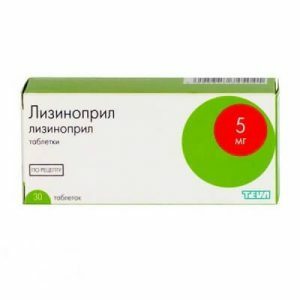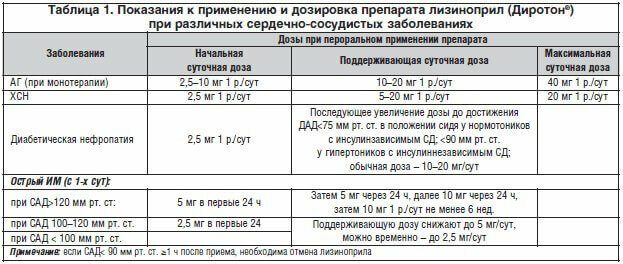Lysinopril: instructions for use and indications for use

Lizinopril is a popular medication that is used to lower blood pressure.He is also able to normalize the functions of the myocardium, dilate the blood vessels and remove sodium salts with urine.If lisinopril is taken for a long period, then blood circulation will improve, the mass of the myocardium and arterial walls will not change.
Table of contents: How does lisinopril work? Lisinopril: indications for use and contraindications. Lisinopril dosage Possible side effectsHow does lisinopril work?
This medication belongs to the cardiovascular group, is a white powder that is very difficult to dissolve in methanol,It does not dissolve in ethanol, but can be used to prepare an aqueous solution.
Lizinopril acts "sightingly" - it widens the arteries, supports the myocardium in patients with diagnosed and progressive chronic heart failure, stabilizes the pressure in the arterial capillaries and normalizes the flow of blood into the myocardium after the transferred or existing ischemic heart disease.
Beginning to "work" the drug in question within an hour after , the maximum concentration of the main active ingredient( and this is lisinopril) in the blood is determined on average after 5 hours( in the same period, the maximum effectiveness appears), andThe duration of the drug is 24 hours.
Lizinopril: indications for use and contraindications
Immediately specify - an individual intake of lisinopril is strictly prohibited!Indications for its use are:
- diabetic type nephropathy;
- acute myocardial infarction( used with the first symptoms for early treatment);
- steadily increased blood pressure;
- chronic heart failure.
It is clear from the list of diseases in which it is advisable to carry out therapy with the drug under consideration, without special appointments of the doctor it should not be done - you need not only to clarify the diagnosis and assess the severity of the pathology, but also to determine the dosage and duration of therapy individually.
Similar strict instructions about the use of lisinopril are also related to the fact that it has a lot of contraindications. In what cases is it strictly forbidden to take the drug:
- pregnancy and the period of breastfeeding;
- is available in history of angioedema or angioedema;
- intolerance to ACE inhibitors( this group includes lisinopril).
Very carefully, with great care and only when it is possible to constantly monitor the patient's condition, prescribe lisinopril in the following pathologies:
-
 any type of diabetes;
any type of diabetes; - Primary aldosteronism;
- cerebrovascular disease;
- hematopoiesis in the bone marrow;
- hyperkalemia;
- aortic stenosis( aortic narrowing);
- pathology of connective tissue, taking place in severe form;
- renal failure;
- coronary insufficiency;
- steadily lowered arterial pressure;
- pediatric practice.
Please note: is uncontrolledly categorically prohibited from taking lisinopril to the elderly and those patients who are on special diet with significant restriction or exclusion of salt intake.
Dosage of lisinopril

Lizinopril does not have any general prescriptions - everything is selected only individually, but this drug is taken in any case only once a day and it is advisable to do it at the same time.
The individual recommendations for the dosage of the drug in question are as follows:
- In a state where the activity of the renin-angiotensin-aldehsterone system is high, the drug in question is taken at a daily dosage of a maximum of 5 mg.If the acute period of the disease has already passed, then later, lisinopril is administered maintenance therapy and in this case the drug is taken at 2.5 mg per day.
- Hypertension of a persistent nature implies the use of 10-15 mg per day of lisinopril for a long period of time.
- Diabetic nephropathy implies that the patient should take the drug in question at a dose of 10-20 mg per day, a more specific dosage is established by the attending physician, being guided by the severity of the course of the underlying disease and the general condition of the patient.
- On a background of heart failure of a chronic type, lisinopril is administered at a dosage of 2, 5 mg per day, then on day 3-5 of the course of therapy, the daily dose is increased to 5 mg.If a supportive therapy course is required for chronic heart failure, the daily dose will be 5-20 mg, but will be selected in a strictly individual order.
- In the treatment of renal failure, the drug in question is administered in a variety of doses - from 2, 5 to 10 mg per day.It is necessary to monitor the patient's condition with such treatment, that is, the appointment of lisinopril for outpatient treatment is impossible.
Special attention should be paid to the purpose of the antihypertensive drug under consideration in acute infarction - it is one of the components of complex therapy at an early stage in the progression of pathology. On the first day, lisinopril is prescribed at a dose of 5 mg per day, then the dose is doubled and administered once every two days( i.e., 10 mg per reception), the last stage of the therapeutic course is taking lisinopril at a dose of 10 mg per day.
Note: for acute myocardial infarction, the medication taken should last at least 6 weeks.
Possible side effects
Lysinopril is not always perceived by the patient's body normally - for example, the most common side effects in the treatment of the medicines considered are:
- pain in the temporal and occipital part of the head, dizziness;
- fast-onset fatigue even under condition of absence of excessive physical exertion;
- disorders of the digestive system - nausea, rarely vomiting;
- cough is dry and unproductive.
Rarely, but there are cases when long-term use of lisinopril provokes the appearance of the following disorders:
-
 significant pressure reduction, accompanied by constantly rapid heart rate;
significant pressure reduction, accompanied by constantly rapid heart rate; - increased daytime drowsiness and sleeplessness at night;
- severe dry mouth, a violation of appetite( periods of complete rejection of food can be replaced by gusts "eat anything that comes to your eyes");
- instability of psycho-emotional background;
- problems with the blood formula - neutropenia, anemia, thrombocytopenia;
- problems in the functioning of the urinary system;
- allergy in the form of rashes on the skin and mucous membranes;
- pain in the joints and muscles.
Lizinopril is a medicinal product actively used in medical practice for the treatment of various cardiovascular diseases. There are also analogues of this drug, which belong to the same pharmacological group and have in their composition similar active ingredients - Lysinoton, Diroton, Lopril and Dapril.The intake of lisinopril and its analogs should not be uncontrolled, since an incorrectly chosen dosage( both downward and upward) can lead to a significant deterioration in health.
Tsygankova Yana Aleksandrovna, medical reviewer, therapist of the highest qualification category


